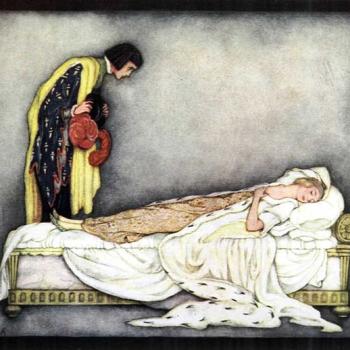On those surprisingly frequent occasions when we imagine what Hell must be like, most of us, I think, tend to see tormented souls languishing in regret and misgiving. We see them writhing in an agony of repentance, sorry that they had wasted their lives in vain pursuits and ignominious sins. If we picture them at all – in any kind of psychological detail – I suppose we picture them in a state of perpetual repining, and ready (if the chance were given them) to pounce on any reprieve that would allow them a second chance at virtuous living.
But lately I have come to wonder if that is an accurate depiction of the eternally lost. I know there is an epic debate raging nowadays as to whether divine punishment is in fact perpetual: universalism is enjoying a recent vogue, and many subtle and well-informed saints are battling one another over the claims of permanent vs temporary damnation. For me, Matthew 25:46 settles the issue, so I am not engaging in that dust-up. What I want to suggest (and it is merely a suggestion) is that there seems to exist some evidence that points to the possibility that the souls in Hell go entirely mad. It’s possible, in other words, that the damned are driven insane by how unimaginably extreme their condition is, and lose their reason and all coherent thought as a result. This would be, naturally enough, part of their undying punishment.
In Deuteronomy, chapter 28, God is letting the Israelites know what’s in store for them in the Promised Land if they do not conform to His wishes. Many terrible things will happen to them. In verse 27 we read that “The LORD will afflict you with the boils of Egypt, tumors, a festering rash, and scabies, from which you cannot be cured.” Then, in verse 28: “The LORD will afflict you with madness, blindness, and mental confusion.” After listing all the calamities that will befall the Hebrews if they persist in being stiff-necked, God adds the final harrowing touch: “You will be driven mad by what you see” (28:34).
Now I have no trouble at all sketching – but only sketching — what Hell must be like, if every trace and atom and hint of God’s love is removed from it. Inconceivable hatred of all possible varieties will rage unchained; fury and bloodlust will tear across the bottomless Lake of Fire without even a remote thought of restraint. “Gnashing of teeth” sounds to me to be exactly the sort of thing infuriated maniacs would do; utter darkness (perhaps suggested by the “blindness” of Dt 28:28) will only aggravate the shrieking madness of souls striking out in panic and confusion. Even in our present lives, sustained pain can induce a sort of temporary crazed state in which we lash out at others – how much more so if the pain is beyond all measurement, unending and without hope of ending?
Doesn’t it seem the most inevitable thing in the world that people in Hell will be “driven mad by what they see”, even if they don’t see anything at all, when they are surrounded by unseen horrors screaming after blood? Aren’t invisible but nearby terrors the most deeply frightening of all? They certainly make us feel more vulnerable and defenseless than any others, for who knows where the next piercing attack will come from?
The damned may be rendered senseless by their nightmare, but not sensationless. One must assume that the whole idea of being thrown into a lake of fire – whether literal or figurative – presupposes pain of a very real sort. Being gnawed by a worm forever must entail a certain amount of discomfort, it’s safe to say, and we know from our own experience that extreme spiritual anguish often expresses itself in physical wretchedness. The inhabitants of insane asylums are rarely at ease in their own bodies.
Mental health is one of the great unsung rewards of eternal salvation. When it comes to Heaven (another very real location) we think of bliss, joy, happiness, and so forth, but all too infrequently of “a sound mind in a sound [resurrected] body”. All our neuroses and psychoses and mental tics will be healed, and a total sanity of outlook will prevail. Complete balance, a sense of proportion, freedom from any skewed perspective, will all be ours. We will be at the very furthest remove from madness, or even a dubious eccentricity. I say a “dubious” eccentricity, because only the negative or questionable will be shorn from us in paradise, and we can look forward to everyone offering their own unique stylistic flavor. I know this will be a bit disappointing to those who relish a shade of mischievousness in their friends, but I trust the reality will be surprisingly refreshing.
Dr Johnson, towards the end of his life, suffered a mild stroke that awoke him one night. He immediately prayed that – no matter how God might afflict his body – the Lord would spare his reason. Being the wisest man of his time, Dr Johnson put the focal point of his petition precisely where it needed to be. Hell will inflict grievous bodily harm and torment on lost souls, and emotional suffering will envelope that physical affliction. But the final coup de grace to the soul that rejects or ignores the gift of Rescue, could be the loss of all reason. Stark raving madness, due to the lack of anything even remotely sane or tender in his environment, may very well be the final stage of any individual’s perdition. If that’s the case, we see now how very serious the stakes are we’re playing for, here, at present, in this now suddenly more beautiful and light-filled world.
















